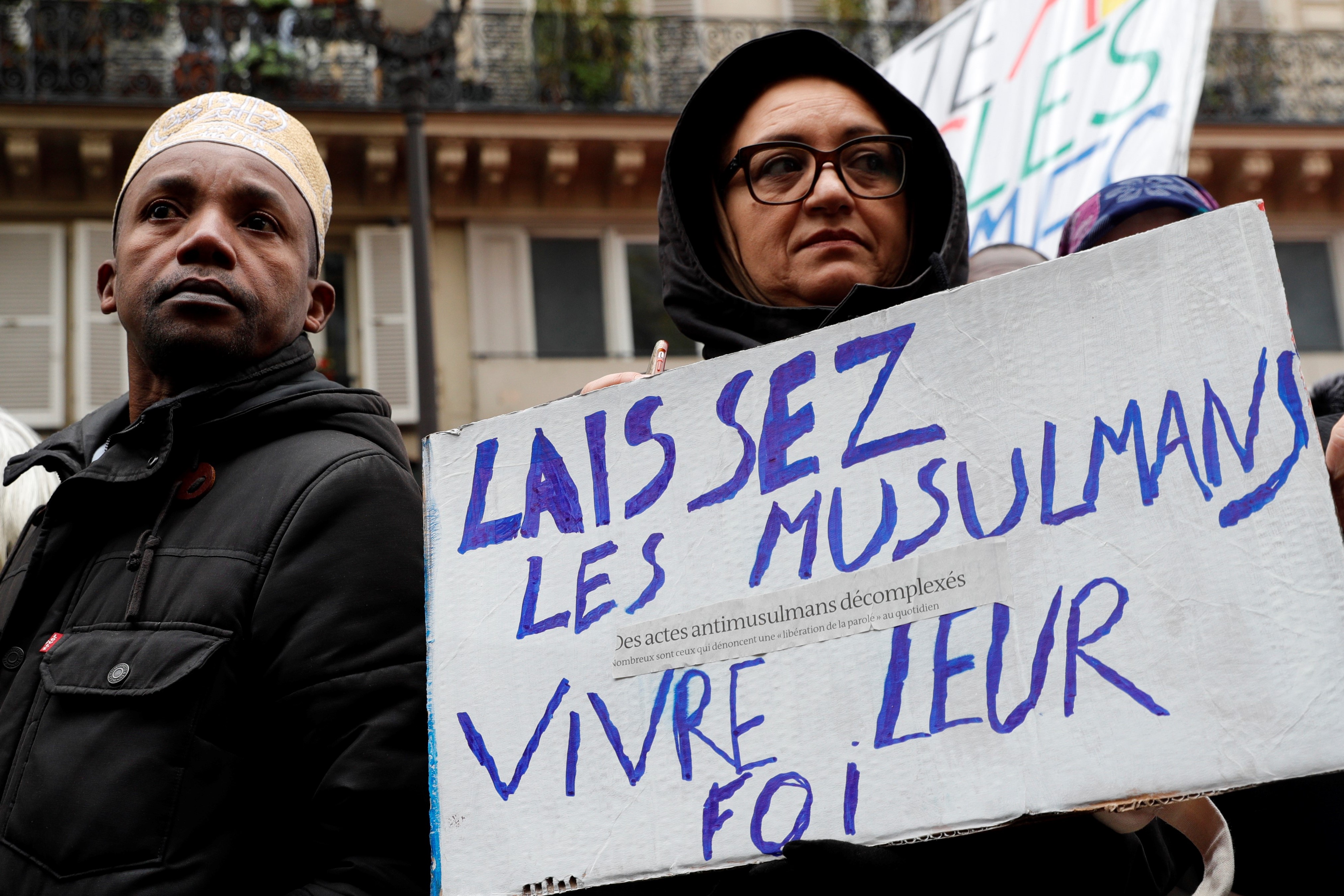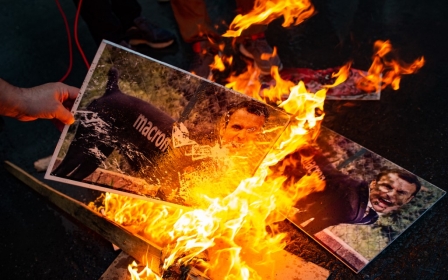France is weaponising its 'republican values' as a means of exclusion

Last week, French President Emmanuel Macron announced his plan against what he calls "Islamist separatism," which includes measures such as a "charter of republican values" a list of "approved imams," a tax on pilgrims and the forbidding of any "political activity" for Muslim organisations.
For the first time in our common history, Muslims are formally asked by the president to choose between "being with the Republic or not being with the Republic," as if there was a doubt about their loyalty to the country.
The government is now moving to dissolve the Collective Contre Islamophobie en France (CCIF), the main human rights organisation addressing discrimination and hate crime against Muslims.
This summarises the French Muslim conundrum.
Arbitrary measures
Stay informed with MEE's newsletters
Sign up to get the latest alerts, insights and analysis, starting with Turkey Unpacked
As a French citizen, I'm always torn between the need to explain (and sometimes defend) the complexity of my country and the urge to raise awareness internationally on what is actually going on here: an accelerated path to the far right's political hegemony in the French political spectrum, as mainstream leaders recode structural racism into "republican policies," mainly targeting Muslim communities for short-term political gain.
As a Muslim man, I'm not always given a choice. I have to explain, with relentless patience, how terrorists have absolutely nothing to do with my understanding of Islam, and why it is, in and of itself, problematic to ask Muslims to distance themselves from political violence, implying that there could be a time and space, be it theoretical, where they would express support for the killing of civilians, innocents, teachers, children... and any variety of barbary produced by terrorists.
In France, security and freedom are opposed, as if they were mutually exclusive concepts. The French government is applying arbitrary measures and is infringing on fundamental freedoms, when Minister of Interior Gerald Darmanin admits that he uses state resources for political motives, conducting raids on mosques, Muslim homes and Islamic organisations that have nothing to do with terrorism, just to "send a message".
What message does the French government want to send us all, nationally and internationally, when human rights organisations working against Islamophobia are being dissolved and designated "an enemy of the Republic," just for criticising government policy?
Weaponising ideals
We are destroyed by what we are going through as a people, between the divisiveness of political rhetoric and the slow demise of our social, educational and health system, between the never-ending stream of terrorist attacks targeting our country and the constant stigmatisation of Black, Arab, Roma, and Muslim minorities, constructed as a problem in France and denied equal treatment in every possible way: from police violence to access to housing, work, education and health.
Laicite evolved from a liberal framework for freedom of religion or belief, into a 'neo-laicite,' an instrument for the demonization and exclusion of any religious visibility
And after every terrorist attack, the same process: the naming, the scapegoating, the repression, the hate. We are denied the right to mourn and defied in the right to hope.
As an advocate for fundamental freedoms, I observe the way France is weaponising its ideals and values as means of exclusion, while still deluding itself (and sometimes others) into thinking it is the everlasting torchbearer of human rights, when so many people are still affected by racism, discrimination and human rights violations as reiterated every year by the National Commission for Human Rights (CNCDH).
On one hand, "laicite," a legal principle enacted in 1905 to separate political power from religious influences, evolved from a liberal framework for freedom of religion or belief, into a "neo-laicite," an instrument for the demonisation and exclusion of any religious visibility (with a deliberate focus on Muslim communities, always at the core of the discussion when laicite is evoked).
A cultural exception?
On the other hand, "freedom of expression" is at stake and is sometimes used asymmetrically, depending on who is the target of the criticism and how much power they can mobilise.
This is how, for instance, Minister of Education Jean-Michel Blanquer can claim that "we should all be conscious and mobilised to defend freedom of expression," while at the same time censoring a cartoon in the press, deleting parts of a historical reference, taking legal action against a teachers' union for criticising his policy or talking about racism.
Even academic freedom is under threat when critical race theory and gender studies are targeted by the National Assembly since they are accused of "separatism" and complicity with terrorism.
And when international organisations, journalists, academics, human rights defenders and observers all across the globe see the same thing and raise concerns about what is going on in France, their comments are dismissed as uninformed and unaware of how "complex" and "specific" the situation is, calling for "more pedagogy" and "respect for the sovereignty of the French model," as if there was a cultural exception that could justify structural streams of racism.
Maybe we should all welcome President Macron's advice and look closer, to actually be better informed on the situation in France.
Facts and data
As a statistician, I like to focus on facts and data. So here are a few. President Macron claims he is not targeting Islam and Muslims in his policy, yet they are the main (and sole) focus of his grand speech in Les Mureaux on "separatisms," with 62 mentions in one single speech.
Police forces and intelligence services are too busy watching Muslim activists and breaking doors to detect and prevent real terrorists
He then moves on to present his plan to regulate Muslim communities at a theological, political, social, legal and financial level, addressing Muslim citizens through a security and control framework, while telling them how they should organise and which imams they are allowed to follow. This led to a petition opposing "a state of exception for Muslim citizens". So much for laicite.
President Macron explains that he makes a clear difference between what he calls "Islamist separatism" and the average Muslim citizen, yet his successive interior ministers have consistently identified mainstream practices of Islam as signs of "radicalisation" and "separatism," ranging from "halal and kosher aisles in supermarkets," "growing a beard," or simply "attending congregational prayers during Ramadan".
The government asked the population to report any suspicious behaviour to the "Stop jihadism hotline," including signs such as a change of diet, a change of clothing style, not listening to music or not watching TV. Unsurprisingly, this line is jammed with false reports on neighbours and colleagues made by "zealous" and "concerned" citizens.
Meanwhile, police forces and intelligence services are too busy watching Muslim activists and breaking doors to detect and prevent real terrorists, only resulting in more victims and more harm to our country, as we collectively fail to address the actual threat.
Structural Islamophobia
President Macron denies the fact that there are structural forms of Islamophobia in France, yet 59 percent of cases of discrimination against Muslims occur in public services. Inflammatory statements have been consistently produced by French government officials over the last 10 years, in what could be called a transpartisan effort to scapegoat Muslims and fuel hatred against them: former interior minister Claude Gueant explained "the number of Muslims is a problem".
A recent survey found that 42 percent of Muslims living in France have faced discrimination because of their religion
Another former interior minister, Manuel Valls, described our situation as a "war of civilisations". Then family minister Laurence Rossignol compared Muslim women wearing a headscarf to "Ni**ers supporting slavery". Current Interior Minister Gerald Darmanin denounced the "'ensauvagement' of the society," a concept forged by the far-right intellectuals. Education Minister Jean-Michel Blanquer explained that "the headscarf is not welcome".
Prime Minister Jean Castex said: "I want to denounce all the compromises that lasted for too many years, the justifications of radical Islamism: should we accuse ourselves and regret colonization?" And President Emmanuel Macron himself explained that wearing a headscarf "is not in line with civility".
So these rhetorics, at the highest level of the French state, have an impact. A recent survey found that 42 percent of Muslims living in France have faced discrimination because of their religion. Sixty percent of women wearing a headscarf share the same experience, and 44 percent of those who do not wear it.
Muslims face physical assault twice as often as their fellow citizens, like the two women who were stabbed near the Eiffel Tower recently, in a case where the prosecutor eventually identified anti-Muslim bias as part of the investigation.
Mosques and Islamic institutions are now also a target for attacks and desecration. Men are also a target for racism. According to a study by the Observatory for the Defence of Rights, young Arab and Black men are 20 times more likely to be stopped and searched by the police, three times more likely to be insulted verbally, and 2.5 times more likely to be physically attacked.
The president and the candidate
So as much as I professionally appreciate President Macron's skilful damage management effort on Al Jazeera, in the New York Times and in the Financial Times to minimise the extent of Islamophobia in France, there is an inescapable and dual reality: France is a target for terrorism, France has a problem of racism. And unless we address both "en même temps," we will fail.
There was once a dynamic and liberal candidate for the presidential election in France. His name was Emmanuel. He would criticise all forms of racism, including Islamophobia. He would consider colonisation as "a crime against humanity".
He would call out those who weaponise laicite against Muslims, while still taking the security agenda seriously and trying to craft a common narrative for our people. He knew better than any other mainstream politician that France can't do without all its children, and he would pose, internationally, as the champion of progress, diversity and equal opportunity for all.
Maybe candidate Emmanuel could teach President Macron a few things.
The views expressed in this article belong to the author and do not necessarily reflect the editorial policy of Middle East Eye.
This article is available in French on Middle East Eye French edition.
Middle East Eye delivers independent and unrivalled coverage and analysis of the Middle East, North Africa and beyond. To learn more about republishing this content and the associated fees, please fill out this form. More about MEE can be found here.








